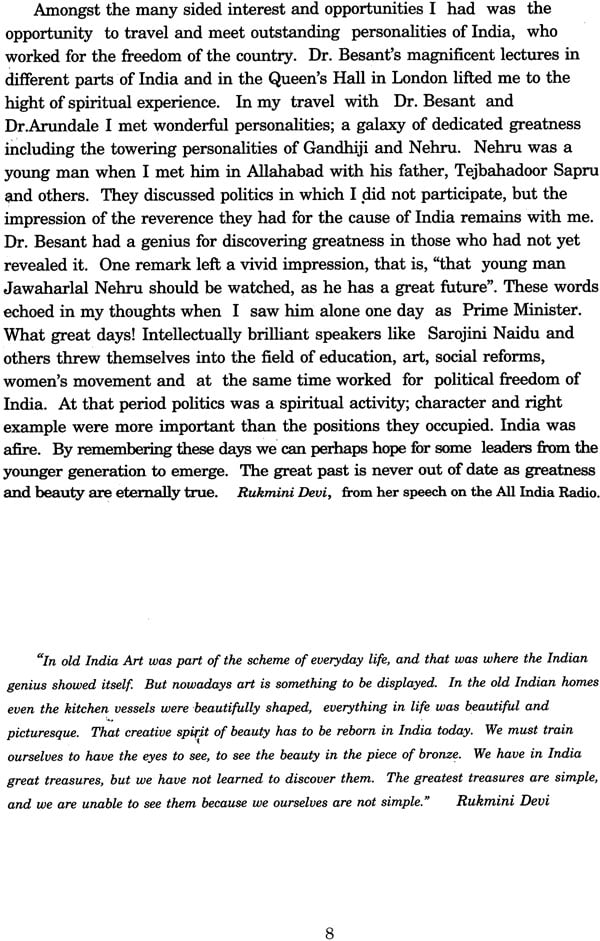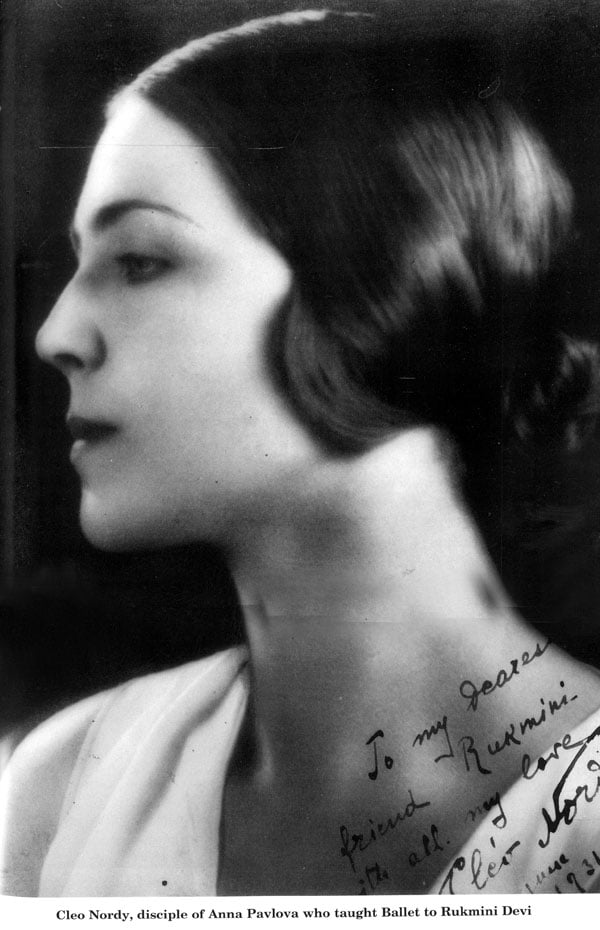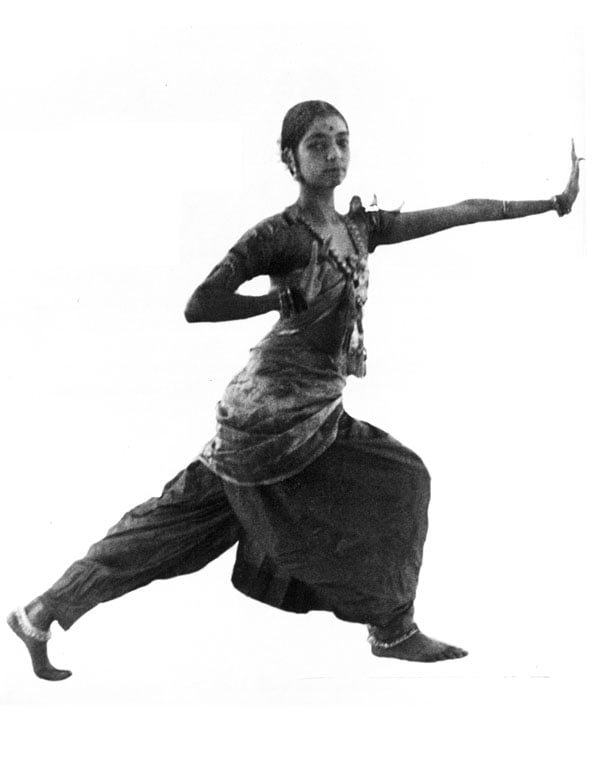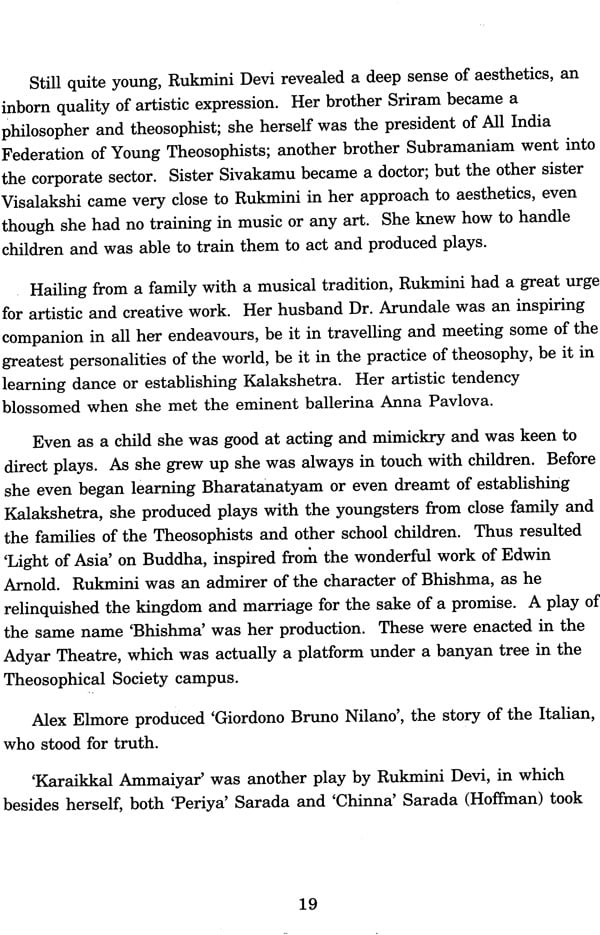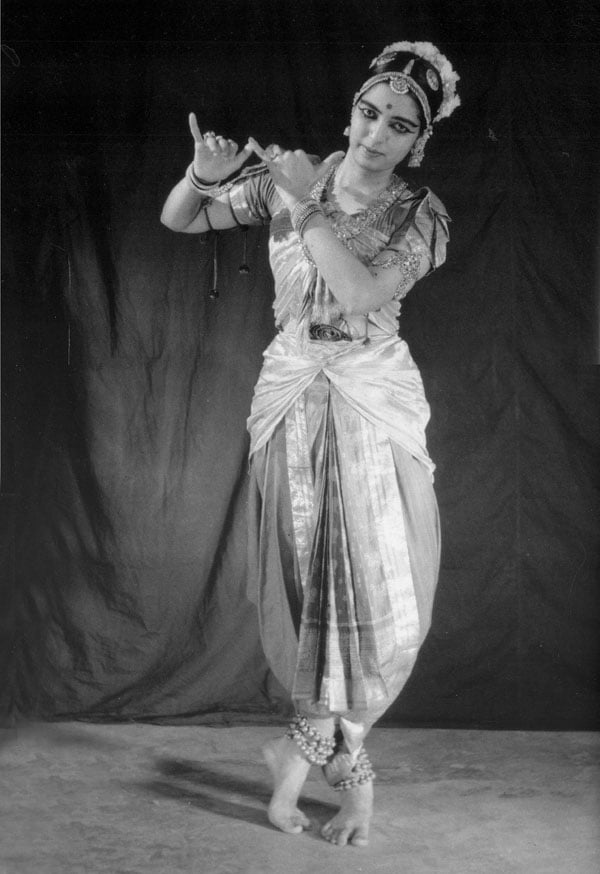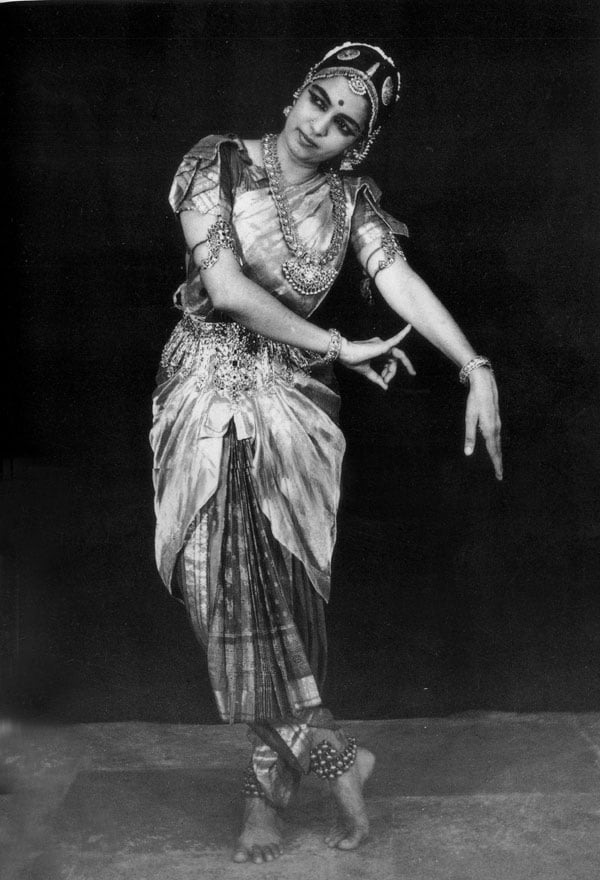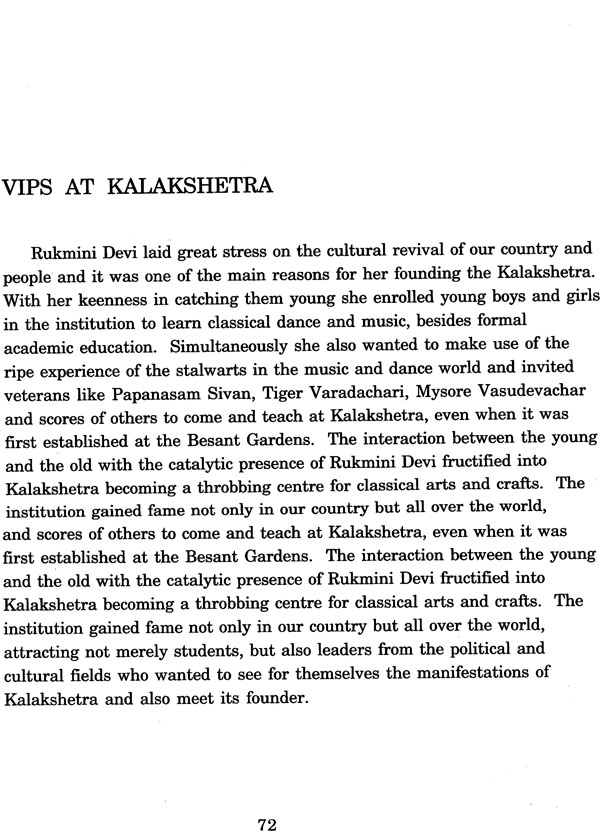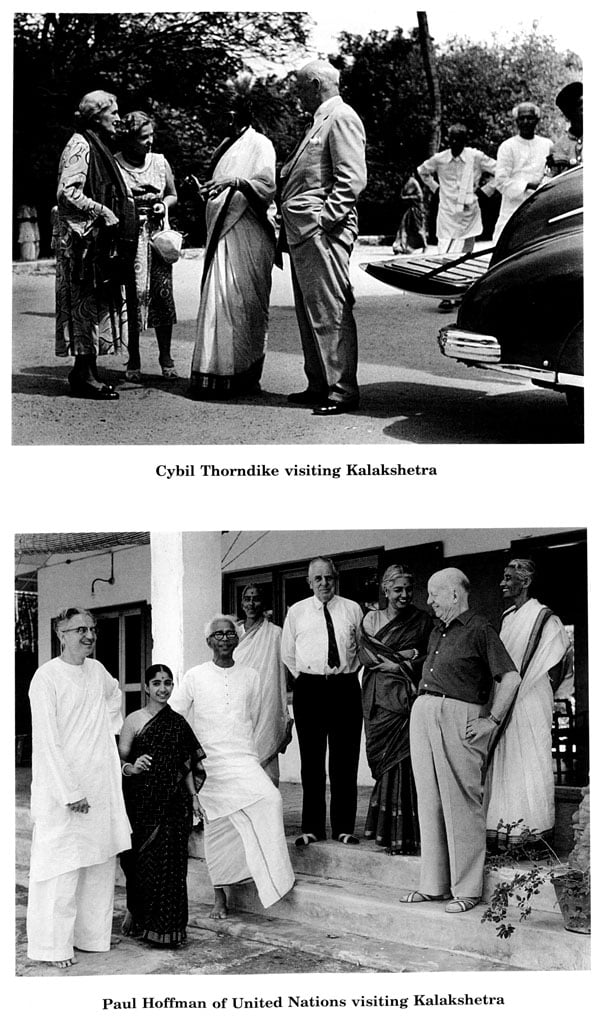
Rukmini Devi (Bharata Natya)
Book Specification
| Item Code: | NAM171 |
| Author: | Conrad Woldring and C. Nachiappan |
| Publisher: | Kalakshetra Publications, Chennai |
| Language: | English |
| Edition: | 2003 |
| Pages: | 83 (Throughout B/W Illustrations) |
| Cover: | Hardcover |
| Other Details | 14.5 inch x 9.5 inch |
| Weight | 1.90 kg |
Book Description
Born in a family of scholars and exposed to the principles of Theosophy due to her father's association with the Theosophical Movement and its leaders like Annie Besant and others, Rukmini Devi grew up with a sense of freedom of thought and expression. In her teens her friendship with George Arundale, an associate of Besant, culminated in their marriage, which in turn earned her the friendship of great artists and scholars, one among them being Anna Pavlove, the world renowned Ballerina.
Her attraction to the classical western dance slowly veered her interest towards Bharatanatya, the classical dance of South India, which she mastered even after starting to learn it in her early thirties. This led her to establishing the Kalakshetra at Chennai, the internationally acclaimed school of dance, music and allied arts. Many stalwarts in these artistic fields came to help her nurture this institution. This institution also endeavoured to inculcate the traditional values in its wards.
Rukmini Devi and Bharatanatya is all about her childhood, her marriage to Arundale, her life as a dancer, the founding of Kalakshetra, her pioneering work in the field of art as well as for the welfare of animals. Her association with and the recognition she won from internationally famous artists, scholars and world leaders are revealed through text and photographs in this book..
Many of Rukmini Devi's admirers all over the world expressed a wish to write a biography of her many faceted personality. It is unfortunate that such a book never came out during her life time. She often mentioned to me about her photographs and their importance of being preserved for posterity; though I have been aware of this, I could not find the time somehow to put them together. It has been possible for me now to do this work after I took sanyasa, when I became free from other business pressures.
I am not a writer, but many people who were intimately connected with Rukmini Devi have either passed on, have either passed on, or have retired; therefore I am left with this work to complete.
Smt Rukmini Devi has been a phenomenon in the cultural history of South India; a most beautiful woman of her time, with grace and dignity befitting a cultured family. She created history in the early 1930s with her debut as an accomplished Bharata Natya dancer at the age of 30!
I have had the good fortune to work with her for almost 50 years till the end of her life in 1986. Day biography should be written about her epoch making life. I have tried in this book an illustrative biography covering 50 years of her outstanding artistic work through these photographs.
I came into contact with Rukmini Devi, when I was studying in the Besant Memorial School at the young age of 12, not realising that it was she who would become the catalyst in bringing out my talents in art. Mr. Conrad Woldring was my teacher in art and photography in my school days from 1937 to 1941, through whom I met her for the first time became intimately connected with her through him. He was an outstanding man, a young theosophist from Holland, who came all the way from his own country to help her work. After he passed away (electrocuted) in 1941, Rukmini Devi saw me through school and college, after which I came to assist her Kalakshetra, working as her personal assistant, in connection with her art activity and as a lay-out man and photographer. During this time I started photographing her work and continued to record all her dance dramas till 1976.
In the days of Conrad woldring there was no colour photography He was adept in black and white pictures, which he produced by proper tonal rendition and contrast. This was to be achieved by proper lighting, akin to daylight conditions, that is, sun as the main light source (like a big solar spotlight) and the sky light as a fill in for the shadows. This lighting technique, was called "available light" photography. The photographs of Rukmini Devi were exposed into the slow black and white film with a main spot light and a fill in light for shadows, (like in the available light technique) small aperture of the lens to increase the depth of field and enhance the overall sharpness. It was remarkable in those days a Rollei camera (Rollei flex) he used was able to make remarkable sharpness in the negatives produced, so that big blowup could be made with least grain.
It is not so easy to expose black and white films, as tonal rendition;
Contrast has to be brought about in single black and white colour. Conrad was adept as a photographer with his only 75 mm Rollei (as Hasseblad, Linholf cameras were not available in those days.) One camera with a tripod and no dark room (as outside photo labs took care of developing and printing) was his philosophy. This brought about his artistic merit in Rukmini Devi's early pictures done 60 years ago.
Besides photography, he also wrote music for children. His "Bambino" composed for children was appreciated by no less a person than Dr. Montessori, who was a pioneer in children's education. His sketches and caricatures were superb too, just right for reproduction in those days, as half tones were difficult to reproduce without art paper.
During his time in India book layouts and ad layouts were nonexistent, therefore his design and layout for the dance programmes of Rukmini Devi enhanced the artistic value of the presentation. His early contribution of design books for the Theosophical Society and Rukmini Devi were very valuable indeed. I am grateful to him and Rukmini Devi for giving me an opportunity to learn photography, layout and designing (during my games period) as he was free only in the evening (and I disliked games, anyway!)
This is the first time that most of her early photographs, the negatives of which were passed on to me by conrad Woldring in 1941, along with those I made of her work from 1941 to 1976, are being published in a book form in two volumes. Volume I deals with Rukmini Devi as a young dancer and her early work and Volume II deals with the dance dramas produced by her during well over 30 years. I have endeavoured to preserve the continuity of her work from her early days till 1986, when she passed away from our midst.
These negatives taken during the 50 years are about 5000 in number and have been well preserved over the years for posterity, thanks to the advanced technical means available today.
I have chose articles by Betsan Coats, James Cousins, K, Chandrasekaran,
Sarada Hoffman, Barbara Sellon, Dr. Arundale, Se Muthia who closely associated with Rukmini Devi, and those by Rukmini Devi herself, written earlier on different occasions.
I wish to thank Ms Lakshmi Venkatraman, who helped me to edit and proof read the text, Mr. Prem Kumar of Rapid Scan and Mr. Arun Verghese of Lokwani Hallmark Press who cooperated in printing these volumes.
| 1 | Early days, in her own word |
| 2 | The Bright Star |
| 3 | It all began |
| 4 | Besant School, early days and early plays |
| 5 | Ambassador of the Arts |
| 6 | Rukmini Devi's Dance: a spiritual myatery |
| 7 | Ravival of Bharata Natya |
| 8 | Iternational Academy of the Arts |
| 9 | Guru |
| 10 | Concept of Culture |
| 11 | Bharata Natya |
| 12 | A Rebel's Legacy, a Cultural Empire |
| 13 | ViPS at Kalakshetra |
| 14 | Weaving Designs |
| 15 | Kalakshetra Publications |
| 16 | Rukmini Devi on her Life and Art |
